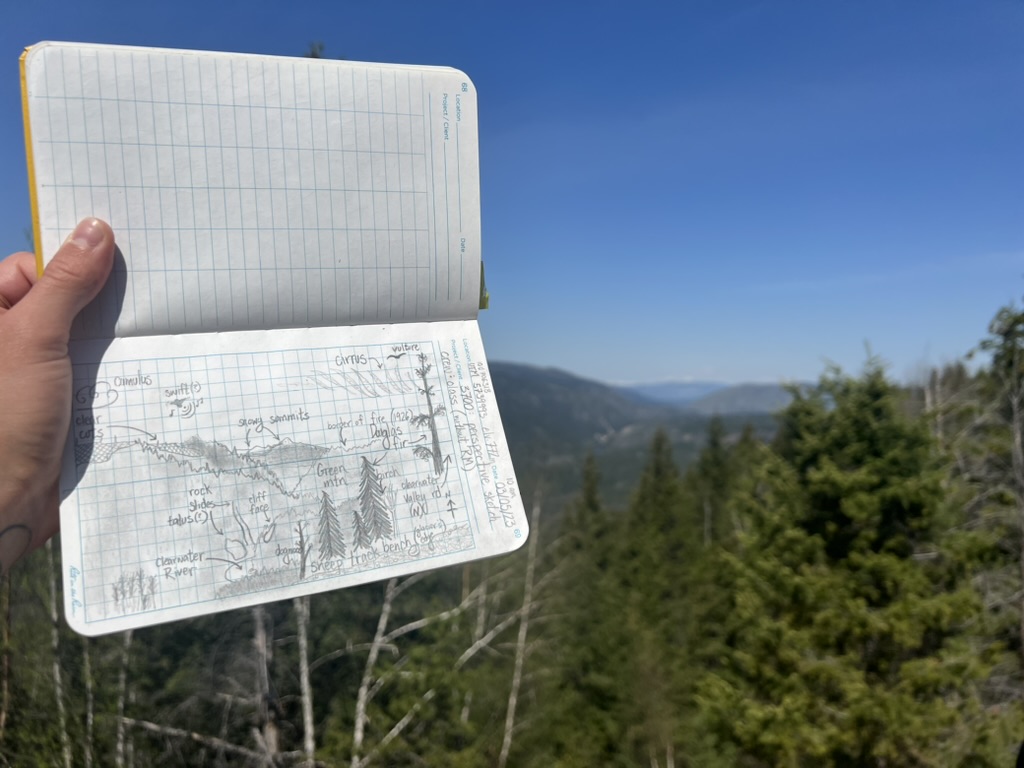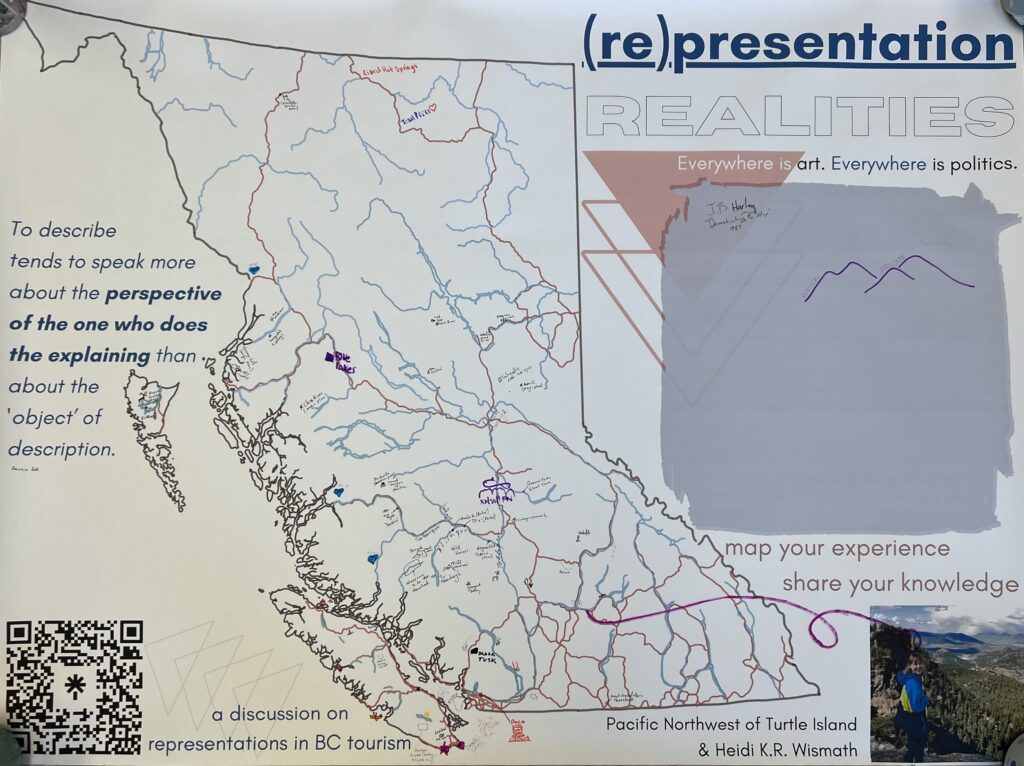S-tcúcmenstem is when we look inside of ourselves, to search for meaning. This is how we understand research. To be a researcher is to seek truth.
That truth must benefit someone else, so it must be accurate, honest, and come from a good place of values and practices.
We learn through research.
Garry Gottfriedson, The Secwépemc Nation Research Ethics Guidelines
INTRODUCTION.
My research journey has consisted of a diverse array of research experiences that have equipped me with the skills, knowledge, and expertise necessary for scholarly inquiry and academic engagement.
A pivotal component of my research trajectory has been my involvement in a Research Apprenticeship during the Fall of 2023 through the Winter of 2024. I undertook two comprehensive literature reviews with the supervision of Dr. Westland titled “On Cultivating a Sense of Belonging and Gratitude to Nature” and “On Critical Academic Friendship,” the latter culminating in the co-presentation at the Western Division of the Canadian Association of Geographers annual conference in March 2024. The year before, in March 2023, I presented my critical analysis of representations of British Columbia in tourism, showcasing my ability to mobilize research findings to scholarly audiences.
In my Directed Studies during the Fall of 2023, I completed a research proposal with the supervision of Dr. Westland which I then submitted for SSHRC funding, showcasing my ability to engage with scholarly literature and in writing grant proposals.
I was a Research Coach in Winter 2023, where I provided guidance and feedback on research diary entries, assisted in formulating research questions, and facilitated assessments of research project presentations, honing my mentoring and leadership skills within the academic sphere.
I successfully acquired TCPS2 CORE-2022 certification in January 2023, evidencing my understanding of the importance of integrity and ethical standards in research. Additionally, my collaborative efforts as co-author of an online resource exploring the November 2021 B.C. Flood Damage exemplifies my capacity to engage in interdisciplinary research projects aimed at addressing pressing societal issues and communicating with the public.
Complementing these practical experiences are the research methods courses I have undertaken, including Introduction to Geographical Analysis, Introduction to Social & Behaviour Geography, Empowering Geographies, Field Courses in Wells Gray and Japan, and Qualitative Methods, which have equipped me with a robust methodological toolkit to undertake rigorous and impactful research endeavours.
Through these multifaceted research experiences, I have demonstrated my aptitude for scholarly inquiry, ethical research conduct, and collaborative engagement, positioning me as a qualified candidate for the Undergraduate Research certificate.

“Research is formalized curiosity. It is poking and prying with a purpose.”
Zora Neale Hurston
THE STANDARDS.
“If we knew what it was we were doing, it would not be called research, would it?”
Albert Einstein

REFLECTIVE ESSAY.
From the outset, my innate curiosity has been a driving force, but it has been through research activities that I have honed this trait into a powerful tool. I have been taught the art of asking nuanced and insightful questions, which has elevated the quality of my academic endeavours, enriched my relationships, and deepened my understanding of how I perceive reality. The journey of research has taught me that the world is not a static set of rules to be deciphered but rather a dynamic and intricate puzzle, inviting me to participate actively in an unfolding narrative.
My research journey has ignited within me a newfound sense of scientific literacy and appreciation for the nuances inherent in knowledge production and data interpretation. Through rigorous inquiry and critical analysis, I have come to understand the complexities and limitations inherent in a variety of methodologies. I now have the words to express my understanding that knowledge is dynamic and contingent upon context, perspective, and interpretation. This has equipped me with the discernment necessary to navigate the vast landscape of information with humility and skepticism, always striving to interrogate assumptions, consider alternative viewpoints, and engage in constructive dialogue. I am committed to upholding the integrity of the research process, fostering ethical inquiry and transparency, and promoting evidence-based decision-making in pursuit of solutions to our most pressing socio-environmental challenges.
Through feminist critical theory, I have been shown that research is inherently imbued with cultural values and power dynamics. Through this lens, I see that research cannot be divorced from its social, cultural, and political contexts and that it is never value-neutral. This revelation has strengthened my conviction that research must go beyond generating knowledge to actively contribute to equity, justice, and empowerment.
I am committed to an ongoing process of decolonizing my ways of knowing, being, and doing, which – especially in my research – includes centring marginalized voices, challenging hegemonic structures, and advocating for research that fosters inclusivity and social transformation. By foregrounding principles of equity and justice in my research endeavours, I aspire to enact tangible and meaningful change in a good way.
At the heart of my research journey lies a deep focus on acknowledging the interconnectedness and intrinsic worth of all entities. This centring has been particularly pronounced in my (re)conceptualization of water and the vital role of hydrologics in planetary health. Instead of documenting symptoms of environmental degradation, I am now committed to challenging the exploitative assumptions embedded in my culture and fostering a deeper empathy for water as a fundamental element of life.
My research interests have recently converged at the intersection of environmental sustainability, creative communication, and decolonial praxis, with a particular focus on utilizing Playback Theatre as a tool for empathy-building and inspiring sustainable behaviours. In retrospect, I realize that my research journey was accompanied by a process of unlearning deeply ingrained misconceptions. I had erroneously confined the scope of valuable knowledge to the realm of physical sciences, neglecting the richness of interdisciplinary and qualitative inquiry. However, through my research journey, I have been encouraged to embrace the integration of intellect and intuition, recognizing it as a potent force for catalyzing positive change.
I never would have guessed when I wrote in 2016 (see photo directly above), “I want to meld my environmental convictions with my passion for theatre – that’s how I’ll reach people, through emotion and ideas” that I’d be able to follow that passion into research. It’s been indescribably transformative to find that I can make valuable contributions to my community in ways that align with my interests and abilities.
Looking ahead, I am filled with a sense of anticipation and gratitude as I embark on the next phase of my academic journey—a period of self-directed inquiry, with particular attention to my ongoing process of decolonization through (re)connection with my ancestral culture (Gàidhlig) and pursuit of meaningful service within my community—before pursuing Master’s degree, which will be rooted in that foundation of commitment to honouring circles of kinship.
I am deeply grateful to the friends, mentors, and community members who have supported and guided me along this path, and I am eager to continue learning, growing, and contributing to the collective endeavour of cultivating more equitable and reciprocal communities.
In conclusion, my research journey has been marked by a synthesis of curiosity, creativity, and conviction—a journey that has not only expanded my intellectual horizons but has also transformed my way of thinking, behaving, and communicating research. As I tread forward, I do so with humility, intentionality, and a steadfast commitment to walking with care and wisdom, embracing my inherent interconnectedness with all life forms on this precious planet.

“The time will come when diligent research over long periods will bring to light things which now lie hidden. A single lifetime, even though entirely devoted to the sky, would not be enough for the investigation of so vast a subject… And so this knowledge will be unfolded only through long successive ages.
There will come a time when our descendants will be amazed that we did not know things that are so plain to them…
Many discoveries are reserved for ages still to come, when memory of us will have been effaced.”
Seneca, Natural Questions



